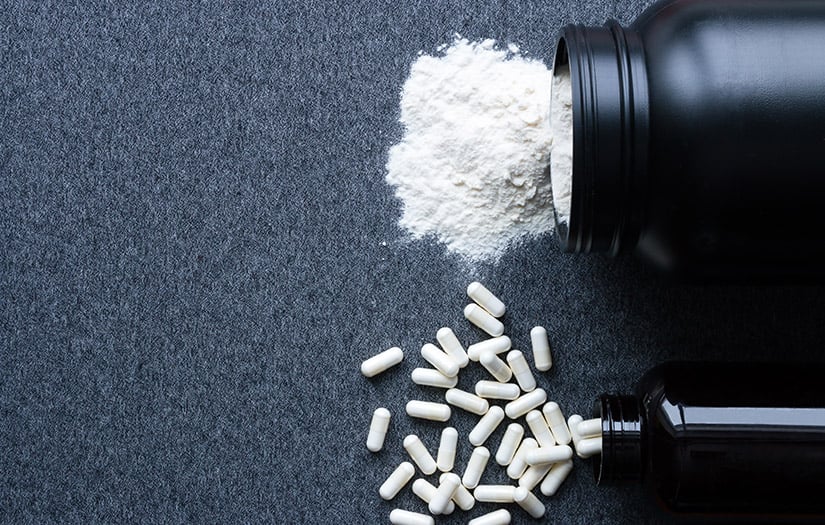Creatine Explained: Benefits, Risks, And Dosage Information

Table of Contents
Understanding the Benefits of Creatine Supplementation
Creatine is a naturally occurring organic acid primarily found in muscle tissue. Your body produces it naturally from amino acids, but supplementation can significantly boost levels, leading to a range of performance-enhancing effects.
Enhanced Muscle Growth and Strength
Creatine's primary mechanism involves increasing muscle cell hydration and boosting the production of ATP (adenosine triphosphate), the primary energy currency of cells. This enhanced ATP availability fuels muscle contractions, leading to increased strength and power. Moreover, creatine promotes muscle protein synthesis, the process by which your body builds and repairs muscle tissue. Numerous studies have confirmed creatine's effectiveness in boosting strength and power gains. For example, a meta-analysis published in the Journal of Strength and Conditioning Research showed significant improvements in strength and power output among individuals using creatine supplementation.
- Improved athletic performance
- Increased lean muscle mass
- Enhanced muscle hydration
- Increased reps and heavier weights lifted
- Faster recovery times between sets and workouts
Improved High-Intensity Exercise Performance
Creatine's role in ATP replenishment is especially crucial during high-intensity activities. Short bursts of intense exercise, such as weightlifting, sprinting, and plyometrics, deplete ATP rapidly. Creatine supplementation helps to replenish these stores more quickly, leading to improved performance and reduced fatigue. You'll be able to push harder and longer, leading to greater gains in muscle mass and strength.
- Increased anaerobic capacity
- Enhanced sprint performance
- Improved power output
- Reduced muscle fatigue during intense workouts
- Improved cognitive function (some studies suggest benefits here, but more research is needed)
Potential Cognitive Benefits
While creatine's muscle-building benefits are well-established, emerging research hints at potential cognitive benefits. Some studies suggest that creatine supplementation may improve memory, learning, and reasoning abilities, particularly in individuals with specific cognitive impairments. However, research in this area is still limited, and more studies are needed to fully understand the extent of these cognitive effects. It's important to approach these claims with a degree of caution.
- Potential improvements in memory
- Potential improvements in focus and concentration
- Potential improvements in reasoning abilities
- Results may vary significantly between individuals; more research is needed
Potential Risks and Side Effects of Creatine
While generally considered safe, creatine supplementation can cause some side effects, most of which are mild and temporary.
Common Side Effects
The most commonly reported side effects are usually related to water retention. This can manifest as weight gain, bloating, and stomach cramps. Nausea is another potential side effect, although it's less frequent. These side effects are typically dose-related; lowering the dosage often alleviates these issues. Cycling creatine can also minimize these side effects.
- Water retention (leading to weight gain)
- Gastrointestinal discomfort (cramps, bloating, nausea)
- Muscle cramps (in some individuals)
Long-Term Effects and Safety
Numerous studies have investigated the long-term safety of creatine supplementation, and the consensus is that it's generally safe for healthy adults when used according to recommended guidelines. However, individuals with pre-existing kidney or liver conditions should consult their physician before taking creatine. More research is always needed to further confirm long-term safety, but current evidence suggests that creatine is well-tolerated by most healthy individuals.
- Generally considered safe for short- and long-term use in healthy individuals
- Consult a healthcare professional before use, particularly with pre-existing health conditions
- Further research on long-term effects is always beneficial
Creatine Dosage and Supplementation Guidelines
Optimizing your creatine supplementation strategy involves understanding loading and maintenance phases, as well as the option of cycling.
Loading Phase vs. Maintenance Phase
Many individuals employ a loading phase to quickly saturate their muscles with creatine. This typically involves taking 20 grams per day for 5-7 days. Following the loading phase, a lower maintenance dosage of 3-5 grams per day is sufficient to maintain elevated creatine levels.
- Loading phase: 20g/day for 5-7 days
- Maintenance phase: 3-5g/day
Cycling Creatine
Creatine cycling involves periods of supplementation followed by periods of rest. Some individuals believe cycling reduces the risk of side effects and may enhance long-term effectiveness. However, scientific evidence supporting the benefits of cycling is limited. The optimal cycling schedule varies among individuals.
- Allows for potential reduction of side effects
- Individual responses to cycling vary
- Consult a healthcare professional for personalized advice
Creatine and Hydration
Creatine supplementation increases water retention in muscle cells, which is beneficial for muscle growth and strength. However, this also necessitates increased water intake to prevent dehydration. Adequate hydration is crucial for overall health and performance when using creatine.
- Drink plenty of water throughout the day
- Increase water intake during and after workouts
Conclusion: Making Informed Decisions about Creatine
This comprehensive guide, “Creatine Explained,” has outlined the potential benefits and risks associated with creatine supplementation, emphasizing the importance of proper dosage and adequate hydration. Remember, while generally safe, consulting a healthcare professional before starting any new supplement regimen, especially if you have pre-existing health conditions, is crucial. Now that you've learned more about Creatine Explained, make an informed decision about whether it's right for you, and use this guide to optimize your creatine supplementation strategy.

Featured Posts
-
 Hondas 15 Billion Ev Project In Ontario A Pause In Production
May 16, 2025
Hondas 15 Billion Ev Project In Ontario A Pause In Production
May 16, 2025 -
 Debate Heats Up Car Dealers Resistance To Electric Vehicle Requirements
May 16, 2025
Debate Heats Up Car Dealers Resistance To Electric Vehicle Requirements
May 16, 2025 -
 The Economic Fallout Of Trumps Tariffs Californias 16 Billion Loss
May 16, 2025
The Economic Fallout Of Trumps Tariffs Californias 16 Billion Loss
May 16, 2025 -
 Supporting Korean Players The Ha Seong Kim And Blake Snell Connection
May 16, 2025
Supporting Korean Players The Ha Seong Kim And Blake Snell Connection
May 16, 2025 -
 San Diego Padres Opening Series Key Details And Sycuan Casino Partnership
May 16, 2025
San Diego Padres Opening Series Key Details And Sycuan Casino Partnership
May 16, 2025
Latest Posts
-
 Muncy Ditches Torpedo Bat After 3 At Bats Connects For Game Tying Hit
May 16, 2025
Muncy Ditches Torpedo Bat After 3 At Bats Connects For Game Tying Hit
May 16, 2025 -
 Shohei Ohtani Delivers Walk Off Blow Dodgers Suffer 8 0 Rout
May 16, 2025
Shohei Ohtani Delivers Walk Off Blow Dodgers Suffer 8 0 Rout
May 16, 2025 -
 Cubs Poteet Triumphs In Spring Training Abs Challenge Debut
May 16, 2025
Cubs Poteet Triumphs In Spring Training Abs Challenge Debut
May 16, 2025 -
 Dodgers Historic 8 0 Loss Ohtanis Walk Off Home Run Seals Defeat
May 16, 2025
Dodgers Historic 8 0 Loss Ohtanis Walk Off Home Run Seals Defeat
May 16, 2025 -
 Cody Poteets First Abs Challenge Win A Chicago Cubs Spring Training Highlight
May 16, 2025
Cody Poteets First Abs Challenge Win A Chicago Cubs Spring Training Highlight
May 16, 2025
